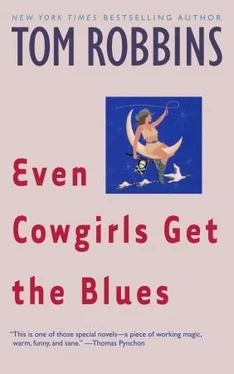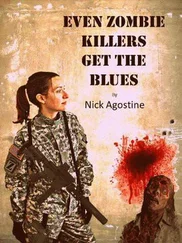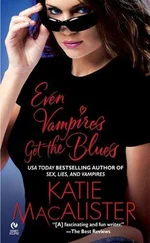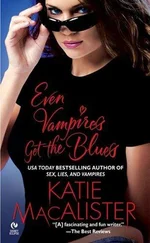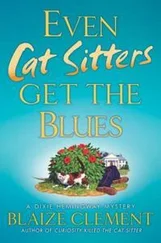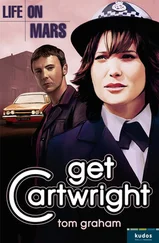After a while she felt something else. Eyes, she felt. Eyes watching her. Not little pink rabbit eyes or jumpy bright bird eyes. Big carnivorous eyes. A wildcat or wolf, for sure. Again, that vast battery of efficient brainpower, insensitive to beauty, romance, fun or freedom; suspicious and careful, as conventional as eggs-for-breakfast, as cheerless as a banker's socks; that stiff-collared DNA fogy who happens to be the major stockholder in human consciousness, issued orders. Obeying, for no commands are as difficult as these to disobey, Sissy picked up a stone and turned around slowly.
“Ha ha ho ho and hee hee,” snickered the thing that was watching her. It stood ten yards away. It was, of course, the Chink.
The Chink's problem was that he looked like the Little Man who had the Big Answers. Flowing white hair and a dirty bathrobe, weathered face and handmade sandals, teeth that would make an accordion jealous, eyes that twinkled like bicycle lights in a mist. He was short but muscular, aged but handsome and O the smoky aroma of his immortal beard! He looked as if he had stolen down from the ceiling of the Sistine Chapel, by way of a Yokohama opium parlor. He looked as if he could talk with animals, discussing with them subjects Dr. Dolittle wouldn't comprehend. He looked as if he had rolled out of a Zen scroll, as if he said “presto” a lot, knew the meaning of lightning and the origin of dreams. He looked as if he drank dew and fucked snakes. He looked like the cape that rustles on the backstairs of Paradise.
They scrutinized one another with mutual fascination. Sissy held her breath and the Chink said, “Ha ha ho ho and hee hee.”
At last she thought of something to say, but, as if he sensed that she was about to speak and did not want her words in his strangely pointed ears, he whirled, and scampered up the mountainside whence he had come.
“Wait!” she cried.
Warily, he stopped and turned, poised to flee again.
Sissy smiled.
She raised her ripe right thumb.
And jerking it and swooshing it and wringing every flicker from it, as though this were its farewell performance and it must please the gods, she hitchhiked the hermit and his mountain.
And got a ride to the clockworks.
I am not of your race. I belong to the Mongol clan which brought to the world a monstrous truth: the authenticity of life and the knowledge of rhythm. . You do well to hem me in with the hundred thousand bayonets of Western enlightenment, for woe unto you if I leave the dark of my cave and set about in earnest to chase off your clamorings.
— Blaise Cendrars
52.
FOR CHRISTMAS THAT YEAR, Julian gave Sissy a miniature Tyrolean village. The craftsmanship was remarkable.
There was a tiny cathedral whose stained-glass windows made fruit salad of sunlight. There was a plaza and ein Biergarten . The Biergarten got quite noisy on Saturday nights. There was a bakery that smelled always of hot bread and strudel. There was a town hall and a police station, with cutaway sections that revealed standard amounts of red tape and corruption. There were little Tyroleans in leather britches, intricately stitched, and, beneath the britches, genitalia of equally fine workmanship. There were ski shops and many other interesting things, including an orphanage. The orphanage was designed to catch fire and burn down every Christmas Eve. Orphans would dash into the snow with their nightgowns blazing. Terrible. Around the second week of January, a fire inspector would come and poke through the ruins, muttering, “If they had only listened to me, those children would be alive today.”
It was a fascinating gift and not inexpensive, but Sissy might have known there was a catch to it.
Julian couldn't keep to himself very long the information that the village had been made by a young man who had had both arms amputated after a tricycle accident at age three. He had made the village with his toes. Moreover, the fellow was in trade school, studying to be a pastry cook. In another year, he would be decorating cakes.
Naturally, this was supposed to be inspirational to Sissy.
Julian even arranged for Sissy to meet the student chef, whose name was Norman. He left the disabled pair alone in a coffee shop, where they might speak heart to heart for half an hour. When Julian returned, he found that Sissy had talked Norman into carving a Tyrolean with enlarged thumbs to hitchhike up and down the streets of her village.
53.
THE CHRISTMAS HOLIDAYS were mellow and cozy for the Gitches, after a rather tempestuous autumn.
Sissy had returned to New York on October 8, to face an angry, anxious husband and an incredulous Countess. Where had she been; why hadn't she telephoned; had she aided and abetted the Rubber Rose coup d'état and so forth. She was Perry Masoned from pillar to post, and Franz Krafkaed, too. Only when she threatened to leave again did the interviews finally cease.
For the Countess's part, his attitude toward the revolt on his ranch was ambivalent. One day he would curse the cowgirls as the most disgusting cat pack of female filth to ever gag a decent nostril, and the next day he would reiterate how much he admired women who could make their way without men and would wish them luck. He'd lost interest in the ranch, he said. Now that he had friends in the White House, the taxes the Rubber Rose saved him were a drop in the bucket; he could save more with a single phone call.
“That ranch is anal excruciation,” the Countess complained, his dentures working over his ivory cigarette holder like a chiropractor realigning the spine of a Chihuahua. “When the market improves, I'm going to sell it. Then we'll watch how the new owners handle those little primitives. Say, are you certain the old fleabag who lives on the butte had nothing to do with all this?”
The Countess was never quite satisfied with Sissy's explanations, but he grew quickly bored with making an issue of it. He scrapped his plans for a whooping crane TV commercial and threw himself into new projects.
Julian, on the other hand, had to be forced to muzzle his interrogations and even then his soft brown eyes narrowed harshly at the most innocent and irrelevant references to Sissy's Rubber Rose assignment. He turned off the radio once when the deejay announced a song by Dakota Staton.
Actually, Sissy would have appreciated someone with whom to talk about Jellybean and the Chink — but there was no one she felt she could turn to. Julian, certainly, would not have been a good listener. As it was, he spent a great deal of time, even at his easel, wondering about the changes that had come over his wife, wondering about their origin, whether they were for better or worse. Before her trip West, Sissy had been an ardent lover but a reluctant student. Upon her return, however, she exhibited wolfish intellectual appetites for Julian's discourses upon history, philosophy, politics and the arts, but her responses between the sheets seemed no more than perfunctory. Had the Yale man gained a brain and lost a vagina? And was the Indian happy about it?
As mentioned, the cheer of Christmas brought an end to their discord. One day, while shopping in East Village boutiques, Sissy snapped out of the stupor she'd been in for weeks. Between second and third fingers, she held a sprig of mistletoe over Julian's head and kissed him right on the street. She hummed a carol on the way home. Through the holidays, she was gay and bright, with only an occasional far-away look in her eyes.
Then, on December 31, a few hours before the Gitches were to join the Barths for New Year's Eve at Kenny's Castaways, the news broke that several hospitals in both America and Denmark had been privately following a policy of letting deformed babies die. On the CBS Evening News, one doctor was heard to say, “If a baby is too deformed to be loved, then its life is going to be hell. Death is mercy for the unlovable.” The disclosure slammed Sissy into a dungeon of depression, from which she did not begin to emerge until sometime in February, when she came across by chance an item in the Times .
Читать дальше
